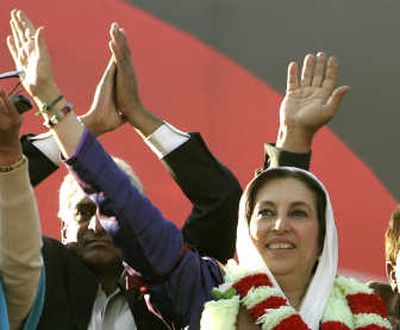‘Daughter of destiny’

She was, by her own account, a “daughter of destiny” from an aristocratic Pakistani family who inherited her father’s political mantle and went on to become the Muslim world’s first female prime minister. But in the end, that destiny proved a tragic one: Like her father, Benazir Bhutto was killed for her political ambitions.
The suicide attacker who cut short Bhutto’s life at 54 on Thursday brought to a close a remarkable biography encompassing a privileged childhood, degrees from Harvard and Oxford, hard time as a political prisoner and mass adulation and contempt alike for her two terms as Pakistan’s prime minister. After eight years of self-imposed exile, she had gone back to her native land in October to try for a third.
A defiant and strong-willed figure, instantly recognizable in her trademark white headscarf, Bhutto never flagged in her belief that she was the best person to lead her nation to democracy and prosperity. That confidence led her to declare herself “chairperson for life” of the opposition Pakistan People’s Party and to an imperious style that rewarded loyalists but alienated many others.
Her charisma and skillful political maneuvering were undeniable – and sometimes masked by her double stint as prime minister being at best a mixed bag, dragged down by allegations of corruption and criticism of her lavish lifestyle.
But Bhutto made an indelible mark not just on her home country but on the world political scene, both for her gender and her outspoken insistence on the need for Pakistan to remake itself into a secular, liberal state.
Despite her shortcomings, “what will remain is a commitment to democracy – to moderate, centrist values, tolerance, a role for women and an accommodation with India,” said Stephen Cohen, a South Asia expert at the Brookings Institution. “She helped create a new identity for Pakistan as a place where women could be prime minister.”
Her death leaves a huge void at the top of her party, one that will be difficult to fill in a region where personality cults reign. Bhutto’s three children are too young to continue the dynasty began by her father, Zulfikar Ali Bhutto, who served as president and prime minister before being hanged by military dictator Mohammad Zia ul-Haq.
Benazir Bhutto was born June 21, 1953, the first of four children in a well-to-do landowning family in southern Sind province.
So sheltered was Benazir’s early life that, at 16, she was completely unprepared for life at Radcliffe College, Harvard University.
“I cried and cried and cried because I had never walked to classes in my life before,” she once told an interviewer.
“I’d always been driven to school in a car and picked up in a car, and here I had to walk and walk and walk. It was cold, bitterly cold, and I hated it … but it forced me to grow up.”
From Harvard, she went on to Oxford University to study politics, philosophy and economics.
Her sights were still set on a possible career as a diplomat rather than a politician.
But going home radicalized her: Soon after her return, in 1977, her father was ousted as prime minister in a military coup and imprisoned, and martial law was declared. Two years later, Zulfikar Ali Bhutto was executed, which became the defining moment in his eldest daughter’s life, launching her full-bore into politics.
“I told him on my oath in his death cell, I would carry on his work,” Benazir later said.
She paid a price for her promise. Over the next five years, with the Pakistan People’s Party outlawed, Bhutto was in and out of detention, sometimes at home, under house arrest, or in prison, under harrowing conditions. She was allowed to leave Pakistan in 1984
When martial law in Pakistan was lifted in December 1985, Bhutto felt the time had come to return.
The momentum of her welcome propelled her on a national tour and then her party to victory in parliamentary elections in November 1988.
Government, however, proved difficult for both of Bhutto’s terms as prime minister, from 1988 to 1990 and 1993 to 1996. She was credited with ending media restrictions and speaking out for women’s rights, but she was constrained by the military and the mullahs, Pakistan’s two most powerful institutions.
Most damaging were the accusations of corruption that began to surface. Bhutto made little secret of her love of the finer things, and she and her husband, businessman Asif Ali Zardari, lived lives beyond the imaginings of most Pakistanis, with residences in London and New York. The money to finance such opulence was suspected to have come from kickbacks and other shady deals by Zardari, who was nicknamed “Mr. 10 Percent.”
The corruption allegations drove her from office and eventually the country. Her husband spent eight years in prison, though without a formal conviction.
In exile, from her bases in London and Dubai, Bhutto continued to hold sway over her party, contest the corruption allegations against her and promote her vision of a democratic Pakistan.
Upon her return this fall, she took to campaigning for her Pakistan People’s Party in the elections scheduled for Jan. 8, hoping to recapture some of the magic and popular acclaim that had greeted her on her first homecoming, in 1986, and slingshot her to victory.